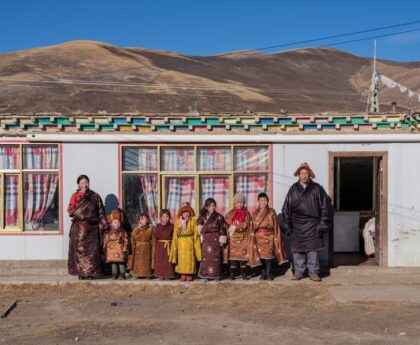The Frontier Wars: A Shameful Part of Australia’s History
The Frontier Wars, also known as the Australian frontier wars or the Indigenous resistance, refer to a dark and brutal chapter in Australia’s colonial history. These were a series of conflicts, battles, and massacres that took place between European settlers and Indigenous Australian tribes from the late 18th century to the early 20th century.
Discovery Hits Home for David Marr
In a recent interview with Laura Tingle, David Marr, an acclaimed author, journalist, and social commentator, revealed his shocking discovery about his own family’s involvement in the Frontier Wars. Marr, upon finding an image of his great-great-grandfather in the uniform of the Native Police, was confronted with the brutal reality that his ancestors were employed to kill Aboriginal people. This revelation sent shockwaves through Marr’s world, reshaping his understanding of Australia’s past and prompting him to write a book about his family’s history.
Marr’s initial shock was soon overshadowed by the realization that the scale of violence and destruction inflicted by the Native Police was far more extensive than previously believed. The Native Police, an armed band of killers operating under the Queensland government, were responsible for the deaths of thousands of Aboriginal people over a span of 60 years. Although their records have been largely destroyed, estimates suggest that as many as 40,000 Indigenous lives were lost at their hands.
A Narrative History Unveiled
Marr’s book takes readers on a journey through the history of the Native Police, offering a unique perspective through the eyes of a family intimately connected to their operations. By delving into his family’s involvement, Marr unveils a narrative that reveals not only the insidious nature of the Native Police but also sheds light on the broader context of land appropriation, politics, and the economy that fueled this system of killing. As the story progresses, it becomes evident that the violence inflicted by the Native Police intensified as they moved further north, scarred by notoriety and impunity.
Echoes in Contemporary Australia
The release of Marr’s book, coinciding with the present-day political climate, highlights the disturbing resonances between the racism and discrimination faced by Indigenous Australians then and now. Marr draws attention to the striking similarities between historical attitudes towards the rights and humanity of Indigenous people and the current debate surrounding the referendum on Indigenous recognition and reconciliation. He reveals that the arguments used to undermine indigenous rights and deny the truth of Australia’s colonial past are not new, stretching back to the 1830s.
Atonement, Shame, and National Responsibility
Reflecting on his connection with his family’s history, Marr expresses a complex mix of emotions. While he acknowledges that he personally is not guilty for the actions of his ancestors, he feels a profound sense of shame. Marr believes that this shame extends beyond the individual level and is a national shame. He argues that as European Australians, we have a responsibility to acknowledge and address the historical injustices inflicted upon Indigenous people. He sees his book as an act of atonement and a call to action for all Australians to confront the true history of our country and fulfill our obligations to the Indigenous peoples we conquered.
Continuing the Fight for Reconciliation
Marr’s book and the ongoing debate surrounding the referendum on Indigenous recognition highlight the fact that the Frontier Wars are not a distant memory but rather an ongoing struggle for justice and reconciliation. Marr notes that the wars have not yet ended, and the fight for recognition and reconciliation is simply another round of this enduring battle. He questions how long this struggle will endure and implores Australians to embrace their obligations and work towards a just and reconciled future.
As Australia confronts its dark history and grapples with the legacies of colonialism, it is imperative that we engage in honest and open dialogue, acknowledge the truths of our past, and work towards healing the wounds of the Frontier Wars. The revelations shared by individuals like David Marr serve as a reminder that this is not just a fight for Indigenous Australians, but a fight for the collective soul of our nation.

<< photo by Hunter Newton >>
The image is for illustrative purposes only and does not depict the actual situation.
You might want to read !
- “History in the Making: Unveiling an Epic All-Australian Team with Record-Breaking Debutants”
- “From War-Torn Vietnam to New Beginnings: A Reflection on Australia’s Evacuation of Orphans”
- Exploring the Complex Legacy and Ongoing Controversy of Bruce Pascoe’s Dark Emu
- ‘Lidia Thorpe takes on Sam Newman in impassioned response to call for booing Welcome to Country’
- “Unifying the Spirit: Exploring the Impact of Garma Festival on First Nations Communities”
- “Key Agendas: Linda Burney’s Vision for the Voice in Australia”
- Josh Frydenberg bows out: A look at his legacy and the future of Kooyong
- Emma Roberts Apologises to Angelica Ross for Alleged Misconduct: Navigating Accountability and Redemption in Hollywood
- “Reconciliation Revisited: Emma Roberts Issues Apology to Angelica Ross for Alleged Transgressions”
- Down Under Digest: Tracing the Shadows of Slavery in Barbados
- Tasmania’s Reckoning: Hobart Takes Down Controversial Colonial-era William Crowther Statue
- “Independence Day 2023: Celebrating Australia’s Journey Towards Unity and Nationhood”




